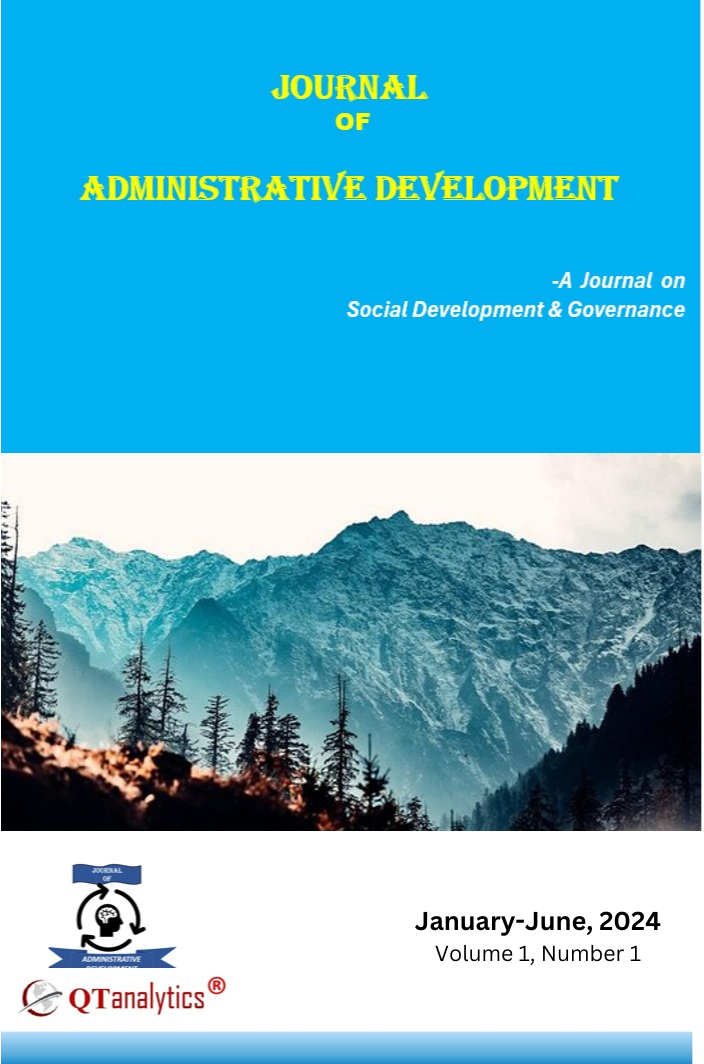Integrated versus Split approach for better Early Childhood Care and Education in India: lessons from the field and policy implications
Keywords:
ECCE, India, Anganwadi, Integrated model, Split Model, Pre School Education, supplementary nutritionAbstract
Early Childhood Care and Education (ECCE) has two major components– care (child nutrition, health & physical care) and education (pre formal education). In India, for children below the age of six years, both the components are being implemented through the Department of Women and Child Development through Integrated Child Development Services. Countries like Brazil have opted for integration within education system while countries like France have taken spilt approach,which is managed by both the education and child welfare department. In the view of very less literature available on whether the split or integrated model is better for achieving early childhood care, this study has tried to explore which approach could be considered better and adopted. This study is a comparative analysis of outcomes of child development amongst three different ECCE institutions (Integrated-within-education, Integrated-within-Social Welfare and Split model ECCE) conducted in Rampur Block, Shimla District,Himachal Pradesh, India. In this study, the physical, mental, language abilities and the nutritional status of 31 children (13 children - 4 to 5 years,18 children - 5 to 6 years) were examined. As per the results of this study, the outcomes in split model of ECCE were considerably better for the younger age group while for the older age groups, both the split and integrated-within-education models were equally efficacious. Hence, the results of this study are more inclined towards adopting the split approach for ECCE. Further, placing a functional infrastructure at Anganwadi centers and need of diverse workforce in the system is encouraged for the best outcomes.
References
1. Edie, D., & Schmid, D. (2007). Brain Development and Early Learning: Research on Brain Development. Quality Matters. 1 (Winter), 1-4.
2. Bennett, J., & Kaga, Y. (2010). The Integration of Early Childhood Systems within Education. International Journal of Child Care and Education Policy, 4(1), 35-43.
3. Chudasama, R.K., Patel, U.V., Kadri, A.M., Mitra, A., Thakkar, D., & Oza, J. (2016). Evaluation of Integrated Child Development Services Program in Gujarat, India for the Years 2012 to 2015. Indian Journal of Public Health, 60, 124-30.
4. Meena, J.K., Verma, A., & Kumar, R. (2017). Evaluation of Integrated Childhood Development Services (ICDS) program implementation in an urban slum of Delhi, India. International Journal of Research in Medical Sciences, 5(8), 3443-3447.
5. NITI Aayog, Programme Evaluation Organisation, Government of India (2015). A quick Evaluation Study of Anganwadis under ICDS. PEO Report no. 227. http://niti.gov.in/writereaddata/files/document_publication/report-awc.pdf. Accessed 3 March 2019.
6. Azim Premji Foundation (2012-13). Review of Pre-School Education within the context of the ICDS program in Medak District, Andhra Pradesh. https://azimpremjiuniversity.edu.in/SitePages/pdf/Medak-Study2012-13.pdf. Accessed 3 March 2019.
7. Sachdev, Y., & Dasgupta J. (2001). Integrated Child Development Services (ICDS) Scheme. Med J Armed Forces India, 57(2), 139–143
8. Ministry of Women and Child Development, Government of India (2015-16). Annual Report. http://www.wcd.nic.in/sites/default/files/annual-report-2015-16.pdf. Accessed 1 March 2019.
9. Kaul, V., & Sankara, D. (2009). Education for All, Mid Decade Assessment, Early Childhood Care and Education in India,National University of Educational Planning and Administration.
http://www.educationforallinindia.com/early-childhood-care-and-education-in-india-1.pdf. Accessed 4 March 2019.
10. Ministry of Women and Child Development, Government of India (2013). Resolution no. 6-3/2009-ECCE dated 27th September 2013. http://wcd.nic.in/sites/default/files/National%20Early%20Childhood%20Care%20and%20Education-Resolution.pdf. Accessed 2 March 2019.
11. Hasan, A. (2007). Public Policy in Early Childhood Education and Care. International Journal of Child Care and Education Policy, 1(1), 1-10.
12. Kaga, Y., Bennett, J., & Moss, P. (2010). A cross-national study on the integration of early childhood care and education within education. Section for Early Childhood Care and Education, Division of Basic Education UNESCO, 1-141.
13. Baliga, S.S., & Walvekar, P.R. (2017). A study on knowledge of anganwadi workers about integrated child development services at three urban health centers. International Journal of Community Medicine and Public Health, 4(9), 3283-3287.

Downloads
Published
Issue
Section
License
Copyright (c) 2024 QTanalytics India (Publications)

This work is licensed under a Creative Commons Attribution-NonCommercial 4.0 International License.
All QTanalytics journals are published Open Access. Articles are licensed under an open access licensed under Creative Commons Attribution-NonCommercial 4.0 International License. In addition, the article may be reused and quoted provided that the original published version is cited. These conditions allow for maximum use and exposure of the work, while ensuring that the authors receive proper credit.
 journals@qtanalytics.in, support@qtanalytics.in | Phone: +91-9458270556
journals@qtanalytics.in, support@qtanalytics.in | Phone: +91-9458270556